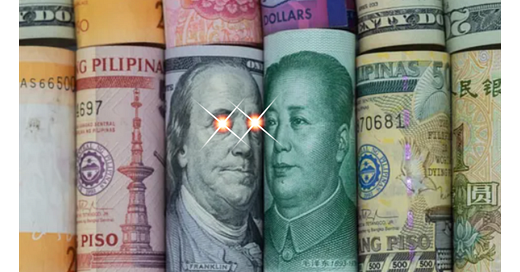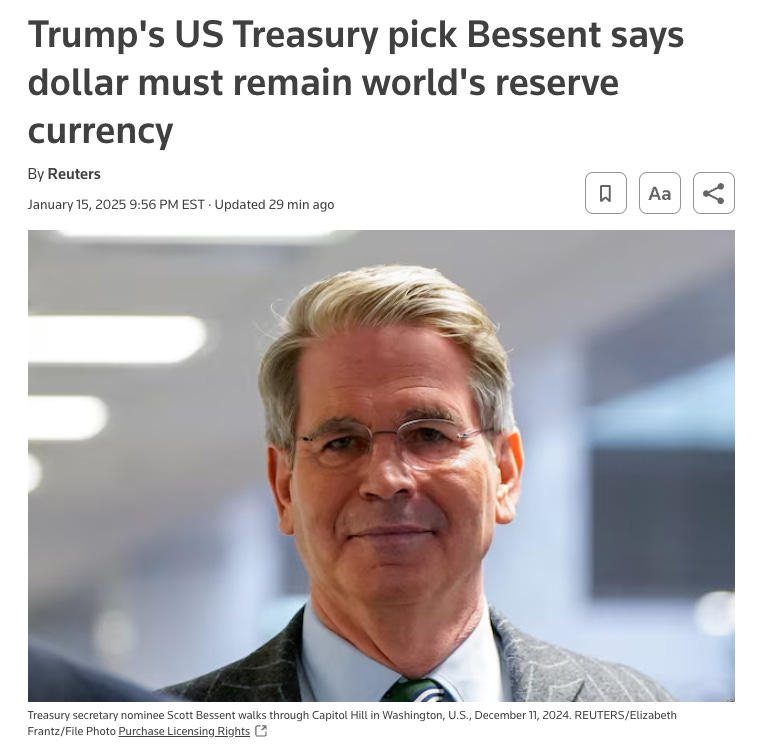America's Next Frontier: Creating an On-chain Free Market For Money
In response to Treasury Secretary Bessent’s “Dollar must remain the world’s reserve currency” and Trump’s crypto America
It is now widely recognized that democracy cannot exist without freedom of speech, and societies that lack this freedom are considered undesirable and regressive. In the coming decades, "freedom to dollar" will achieve a similar status in the American political lexicon — as a fundamental human right, enabled by USD-denominated stablecoins on permissionless networks. Any institution that imposes restrictions on its constituents’ access to on-chain dollar and treasury bonds, if such restrictions are still physically enforceable, will increasingly face widespread disapproval. This new paradigm creates a free market for money—where currencies transcend borders and monopolies, competing on a level playing field fueled by merit, trust, and voluntary adoption instead of coercion.
Freedom to Dollar = Freedom of Speech
It’s a cliché worth repeating: currencies collapse all the fucking time. When people are denied the freedom to choose how they store and transact value, it becomes a form of systemic repression—one that, depending on monetary policies, can be as devastating as slavery.
Of 750 currencies since 1700, only 20% remain, and all the remaining ones have devalued by over 98%. In recent memory, German Mark, Turkish Lira, Argentinian Peso, and Zimbabwe Dollar have all experienced catastrophic devaluations. These failures destroyed economies, life savings, and livelihoods.
However, the demand for USD isn’t confined to extreme situations. Japanese Yen is widely considered a stable currency. If you had held USD instead of JPY over the past 20 years, considering both the exchange rate change and the compounded interest from US Treasury bills, your dollar holdings would be worth approximately 60.3% higher in JPY terms.
More broadly, I want to point out that currencies should compete in a free market, but they currently aren’t. For most individuals and corporations, their choice of currency for storing value and making transactions is largely influenced by their location and the services provided by local banks, which heavily geared towards local currencies and assets.
Stablecoins will make currencies compete in a true free market — through making all forms of money and financial instruments globally available with permissionless networks, apps, good self-custodial UX, and the internet. These technology allows us to see a future in which you can run a corporation or live a life with minimum reliance on the local banking system or currencies. You can start receiving US dollar and hold US treasury bills as long as you are connected to the internet. You can also build an exchange or offer a saving account that’s global since day one — serving customers in countries that you have never heard of. You store value in multi-sigs, exchange through dexes, pay bills with stablecoins from wallet to wallet, and earn yields from staking / lending / t-bill protocols. You can live a dollar life, or with whatever currency you prefer, no matter where you physically are or who you are.
I often hear smart people rebuttal this scenario with, “Other countries would want to maintain currency sovereignty and require the use of their local currency as legal tender.” My argument is that countries can still retain full control over their fiscal and monetary policies, and the their currencies can coexist with a system that empowers individuals and corporations to CHOOSE the currency they use. I like to call this ‘The Open Bartering System’. We’ve always been bartering. We barter with the commodity that we think others will accept the most, which currently happens to be cash denominated in your local currency. When most of banking can be done purely on permissionless protocols accessible via the internet, and people are just one API call away from any currency or asset in the world, what would we barter with? We naturally gravitate towards what is perceived as the world’s strongest currency—and, without a doubt, that is currently the U.S. dollar.
Why US Should Push ‘The Open Bartering System’ to Existence?
In any competition, the frontrunner always favors a fair fight, knowing they’ll win. Right now, the USD is in that position.
However, the playing field isn’t level. Incoming Treasury Secretary Bessent's statement that "the Dollar must remain the world's reserve currency" highlights growing challenges. The rise of BRICS nations promoting the Chinese Yuan and the mounting US federal debt—where interest payments rival defense spending—threaten the Dollar's dominance. To maintain its status, the US needs more global USD holders, transactions settled in USD, and US Treasury bond holders.
As Niall Ferguson notes in The Ascent of Money, "When bond prices fall, interest rates soar, with painful consequences for all borrowers.”
The US has everything at stake to avoid the above scenario, get more t-bill holders, and maintain the Dollar's status as the world’s reserve currency. Stablecoin is on its way to strengthen the dollar. In fact, stablecoin-related t-bill holdings have already surpassed those of Saudi Arabia and Germany, securing a position within the top 20 largest holders globally.
[Ranking: T-Bill Holdings by Country]
The growing federal debt is a frequent topic of debate, with discussions typically centered around cutting spending. While I wish DOGE the best of luck, it’s important to recognize that, in a democracy, political incentives are overwhelmingly stacked against spending cuts. A more viable short-term solution to manage the situation is to expand the pool of debt holders. Increasing demand for government debt drives bond prices higher and lowers nominal interest rates, thereby reducing the cost of servicing the debt. Fully saturating demand for federal debt could provide some fiscal relief while longer-term solutions are pursued.
Is there unsaturated demand for U.S. Treasury bills? Absolutely. Much of the potential demand remains untapped due to technical barriers outside the United States and the lack of proactive efforts to make T-bills accessible to global retail investors. As Ethena’s Docs beautifully state:
“The most important financial instrument in the real world - a dollar denominated means of capital preservation - is a basic product everyone should have the ability to access without permission.”
— From Ethena’s Documentation
Today, countless individuals and institutions outside the U.S. lack direct access to dollars and U.S. Treasury bills, despite the immense demand for the world’s safest currency and yield instruments. Even those whose bank deposits are indirectly tied to T-bills miss out on their full benefits, as local banks often capture the spread in between. By creating a way for people to directly access dollar rails and the surrounding financial system, the U.S., as the debt issuer, could capture that entire spread itself.
When currencies compete fairly in a free market, I believe we’ll see fewer currencies over time. Mediocre ones will gradually be outperformed, while weaker ones will face currency runs and disappear. This consolidation would ultimately benefit the U.S., as the dollar’s dominance would grow stronger, solidifying its role as the world’s primary reserve currency and increasing demand for U.S. financial assets.
Currencies Can’t Be Free Without Self-Custodial Money On Permissionless Networks
It’s impossible to make US dollar and its related financial instruments widely accessible through existing banking system. Most oversea banks and governments don’t have any incentive to open up the free market, and liquidity would be too fragmented even if they somehow make the effort against all odds. We’ve seen this pattern many times: permissionless networks thrive without approval and can only be stopped through active denial, while permissioned systems rely on active support to exist in the first place.
In crypto, there’s a long-lasting debate on whether consumers actually want self-custodial money. Nay sayers of self-custodial argues that ‘custody’ is a verb, and it requires effort no matter how easy we make it. However, worth to point out that the UI of the self-custodial stack has already come a long way. From private keys in hard drives, to seed phrases, then to hardware wallets and passkey in secure enclave, hundreds of thousands of people successfully bought their first crypto token $trump without running into any technical barriers. You can now create a self-custodial wallet with google / phone number auth and a face scan, and on-ramp <$500 in seconds with Apple Pay without KYC.
The benefit of self-custody isn’t limited to protecting your money in extreme scenarios where coercion is a risk. Only with self-custodial stack can any developer offers a saving account with access to US t-bill yield purely through the internet to anyone in the world. This lower the barrier of entry, fosters competition not on getting licenses but on building good products to serve users. If you want to offer that without permissionless systems, no matter through bank or through centralized exchanges, you need to get local liscences, set up local entities and bank accounts, and have a localized product. With permissionless stack, you only need to integrate on / off-ramp services to tap into the global liquidity of any market, and be ready to go.
Meanwhile, people’s need of currencies is not only about accessing currency but also to pay, exchange, earn yield, and borrow it against collaterals / credits. Even as of right now, people who want dollar in Argentina actually have little issue of getting cash dollar in the black market. However, the challenge is to access the payment and financial system around the dollar. When money is on permissionless network, you are immediately tapped into all the dexes and liquidity that’s available on the chain. You can make any protocol available through your app. That’s 1000x more powerful than what any siloed wall-garden can offer. Liquidity and money perhaps is the definition of network effect, and the large st network will be the one that anyone can join. Centralized exchanges all have their regions of service, but Uniswap is always there — accessible to anyone with internet access and money on-chain. We are at the initial phase of this garden without wall for USD, and it’s for sure a very, very exciting time.
My favorite painting in the Louvre is The Coronation of Napoleon. Beyond its grandeur, it captures a profound historical and symbolic moment: Napoleon placing the crown on his own head, a deliberate act that defied tradition and rejected the divine authority of kings. It’s a vivid representation of the triumph of merit, ambition, and the will of the people over the old order of hereditary rule.
Conclusion
This is a very meta prediction on where I see things are going. In the day to day of operating a startup and building a product, things won’t be adopted just because they exist. It’s important to offer consumers unprecedented value before expecting any effort from their end to adopt. The value can be a sleek app that’s 100x better than the current banking experience, a treasury account for companies to hedge against currency risk while maximize safe yields, a savings account that can hold or exchange to any currency, or an app that allows remote workers to send / receive payment from anywhere in the world. Adoption will be gradual, till you can walk into a random coffee shop in another country and see prices denominated in USD.
Do I think the best fiat is the end game for humanity’s exchanging of value? I don’t know. But I do know that the world will benefit greatly from ‘The Open Bartering System’ that allows the people worldwide to FREELY CHOOSE what they barter with. In the short to mid term, USD (hopefully) is the dominated medium that people barter with. From America’s perspective, this is the most important issue for Trump’s upcoming term regarding crypto policies.
That said, I also firmly believe adoption will be grassroots, driven by startups and founders with strong convictions and effective execution. The shift will be propelled by market incentives and great products, and not by any government agency imposing it.
The ticker is $USD
Sources:
https://econofact.org/the-rising-burden-of-u-s-government-debt
https://www.reuters.com/markets/us/trumps-us-treasury-pick-bessent-says-dollar-must-remain-worlds-reserve-currency-2025-01-16/
kunle.app: May 2024: Stablecoins are helping create a buyer of second-to-last resort for US Treasurys
https://www.amazon.com/Ascent-Money-Financial-History-World/dp/0143116177
https://www.coinbase.com/developer-platform/discover/launches/zero-fee-usdc
https://docs.ethena.fi/








